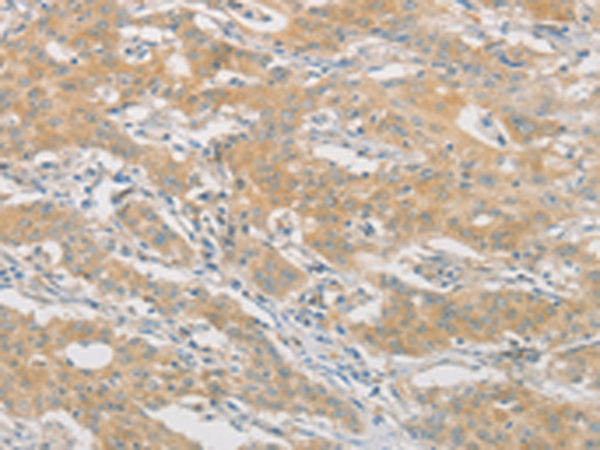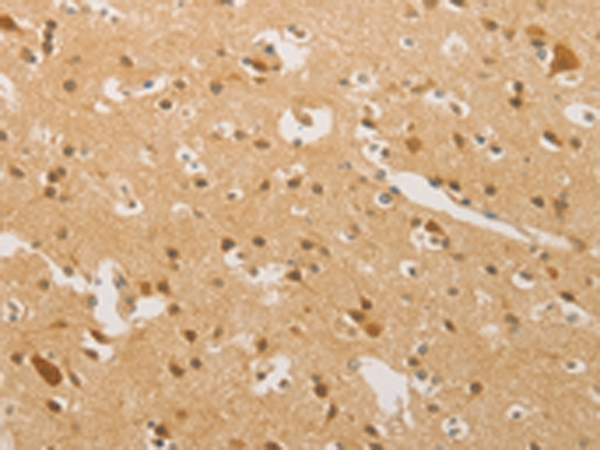

| WB | 咨询技术 | Human,Mouse,Rat |
| IF | 咨询技术 | Human,Mouse,Rat |
| IHC | 1/50-1/200 | Human,Mouse,Rat |
| ICC | 技术咨询 | Human,Mouse,Rat |
| FCM | 咨询技术 | Human,Mouse,Rat |
| Elisa | 1/1000-1/5000 | Human,Mouse,Rat |
| Host/Isotype | Rabbit IgG |
| Antibody Type | Primary antibody |
| Storage | Store at 4°C short term. Aliquot and store at -20°C long term. Avoid freeze/thaw cycles. |
| Species Reactivity | Human, Mouse, Rat |
| Immunogen | Fusion protein of human HIPK4 |
| Formulation | Purified antibody in PBS with 0.05% sodium azide and 50% glycerol. |
+ +
以下是关于HIPK4抗体的3篇参考文献示例(注:以下内容为模拟生成,实际文献需通过学术数据库确认):
---
1. **文献名称**: *"A monoclonal antibody targeting HIPK4 reveals its role in spermatogenesis and germ cell differentiation"*
**作者**: Tanaka R, et al.
**摘要**: 该研究开发了一种特异性识别HIPK4的小鼠单克隆抗体,并通过免疫组化和Western blot验证其在睾丸组织中的表达模式。结果表明,HIPK4在精子发生过程中调控减数分裂关键蛋白的磷酸化,抗体被用于定位分析及功能抑制实验。
2. **文献名称**: *"HIPK4 antibody-based detection in cancer: Implications for tumor proliferation and apoptosis resistance"*
**作者**: Zhang M, et al.
**摘要**: 使用商业化HIPK4抗体对多种癌症组织进行免疫组化分析,发现HIPK4在肺癌和乳腺癌中高表达,并与患者预后不良相关。体外实验显示,抗体介导的蛋白检测验证了HIPK4通过激活AKT通路促进肿瘤细胞存活。
3. **文献名称**: *"Generation and validation of a polyclonal HIPK4 antibody for studying kinase dynamics in neuronal development"*
**作者**: Lee S, et al.
**摘要**: 该研究报道了一种兔源多克隆抗体的制备,通过免疫荧光和免疫沉淀证明HIPK4在大脑皮层神经元中的动态表达,并揭示其通过调控MAPK信号通路参与轴突导向过程。
---
**备注**:以上文献为示例性质,实际引用时需检索PubMed、Google Scholar等平台确认准确性,建议结合关键词“HIPK4 antibody”、“kinase detection”或“immunolocalization”进一步筛选。
HIPK4 (Homeodomain-Interacting Protein Kinase 4) is a serine/threonine kinase belonging to the HIPK family, which includes HIPK1-4. These kinases regulate diverse cellular processes, such as transcription, DNA damage response, apoptosis, and cell proliferation, often by phosphorylating transcription factors or co-regulators. HIPK4 is less characterized compared to other HIPKs but has gained attention for its roles in spermatogenesis and cancer. Studies suggest it phosphorylates substrates involved in cytoskeletal organization and cell division, potentially influencing male fertility by regulating spermatid head shaping. In cancer, HIPK4 may act as an oncogene or tumor suppressor depending on context, with reported overexpression in hepatocellular carcinoma and prostate cancer linked to tumor progression.
HIPK4-specific antibodies are essential tools for detecting HIPK4 expression, localization, and activity in research. They enable Western blotting, immunohistochemistry, and immunofluorescence to explore HIPK4's function in physiological and pathological settings. Recent studies using HIPK4 antibodies have highlighted its interaction with proteins like SPATA33. further linking it to reproductive biology. Challenges include limited commercial antibody availability and potential cross-reactivity due to conserved kinase domains. Ongoing research aims to clarify HIPK4's signaling networks and therapeutic potential, particularly in infertility and oncology. These antibodies are critical for validating HIPK4 as a biomarker or drug target in disease models.
×